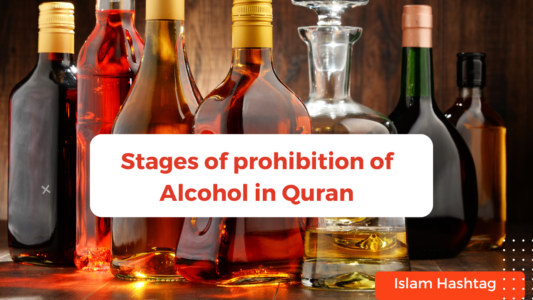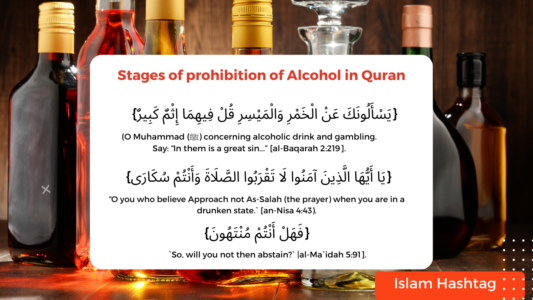Stages of prohibition of Alcohol in Quran
1st stage – Allowed but disapproved
۞ يَسْـَٔلُونَكَ عَنِ ٱلْخَمْرِ وَٱلْمَيْسِرِ ۖ قُلْ فِيهِمَآ إِثْمٌۭ كَبِيرٌۭ وَمَنَـٰفِعُ لِلنَّاسِ وَإِثْمُهُمَآ أَكْبَرُ مِن نَّفْعِهِمَا ۗ وَيَسْـَٔلُونَكَ مَاذَا يُنفِقُونَ قُلِ ٱلْعَفْوَ ۗ كَذَٰلِكَ يُبَيِّنُ ٱللَّهُ لَكُمُ ٱلْـَٔايَـٰتِ لَعَلَّكُمْ تَتَفَكَّرُونَ ٢١٩
“They ask you about wine and gambling. Say: ‘In them is great sin and [yet, some] benefit for people.’” (Quran 2/219)
This is the first injunction concerning intoxicating drinks and gambling, and here the matter has been left merely as an expression of disapproval. This was a preliminary step designed to prepare the minds of people for the acceptance of their prohibition. The injunction prohibiting the performance of Prayer when in a state of intoxication came later, and ultimately alcohol, gambling and the like were categorically prohibited
Then people said, “(intoxicants and gambling) were not prohibited for us. Allah only said, In them is a great sin, and (yet, some) benefit for people.” So they kept drinking Khamr until one day, led his companions in the Maghrib prayer (the Sunset Prayer) and mixed up the Ayat (verses of the Qur’an) in his recitation. Thereafter, Allah sent down a stronger statement.

2nd stage – Not Before Prayer
“O you who have believed, do not approach prayer while you are intoxicated until you know what you are saying” (Quran 4/43)
Then, people would drink before the time of the prayer so that they would attend the prayer while sober. A firmer Ayah (verse of the Qur’an) was later revealed.
This is the second in the chronological sequence of injunctions concerning intoxicants. We came across the first injunction in (Surah al-Baqarah 2: 219). In that verse Allah merely indicated that drinking wine was a great sin, making it clear that it was reprehensible in His sight. This was quite enough to make some Muslims give up liquor altogether, though many others still took intoxicating drinks: they sometimes stood up to pray while still under the influence of alcohol, so that they even made mistakes in their recitations.
This second injunction was probably revealed at the beginning of 4 A.H., making it forbidden, thenceforth, to pray in a state of intoxication. This led people to alter their drinking times. They drank only at those hours when there was no fear of their remaining under the influence of intoxicants when the time for Prayer came. The injunction embodying unconditional prohibition of intoxicants was revealed not long afterwards.
3rd stage – It would be better to go away from them
يَـٰٓأَيُّهَا ٱلَّذِينَ ءَامَنُوٓا۟ إِنَّمَا ٱلْخَمْرُ وَٱلْمَيْسِرُ وَٱلْأَنصَابُ وَٱلْأَزْلَـٰمُ رِجْسٌۭ مِّنْ عَمَلِ ٱلشَّيْطَـٰنِ فَٱجْتَنِبُوهُ لَعَلَّكُمْ تُفْلِحُونَ ٩٠
“O you who have believed, indeed, intoxicants, gambling, [sacrificing on] stone alters [to other than Allah], and divining arrows are but defilement from the work of Satan, so avoid it that you may be successful.” (Quran 5/90-91)
So they said, “We abstained, O Lord!” Later, some people said, “O Allah’s Messenger! Some people died in the cause of Allah, while some others died in their beds, but they used to drink alcohol and indulge in gambling, which Allah has made a Rijs (defilement) of the work of Shaytan (Satan).” So Allah sent down,
“There is not upon those who believe and do righteousness [any] blame concerning what they have eaten [in the past]” (Quran 5/93)
4th stage – It is haram and one of the great sins
إِنَّمَا يُرِيدُ ٱلشَّيْطَـٰنُ أَن يُوقِعَ بَيْنَكُمُ ٱلْعَدَٰوَةَ وَٱلْبَغْضَآءَ فِى ٱلْخَمْرِ وَٱلْمَيْسِرِ وَيَصُدَّكُمْ عَن ذِكْرِ ٱللَّهِ وَعَنِ ٱلصَّلَوٰةِ ۖ فَهَلْ أَنتُم مُّنتَهُونَ ٩١
Satan’s plan is to stir up hostility and hatred between you with intoxicants and gambling and to prevent you from remembering Allah and praying. Will you not then abstain?
It was narrated that Umar bin al-Khattab said:
Before the prohibition of khamr was revealed, ‘Umar said: O Allah, give us a clear ruling on khamr. Then the verse which is in Soorat al Baqarah was revealed: `They ask you (O Muhammad (ﷺ) concerning alcoholic drink and gambling. Say: “In them is a great sin…” [al-Baqarah 2:219]. `Umar was summoned and it was recited to him.
He said: O Allah, give us a clear ruling on khamr, and the verse which is in Soorat an-Nisa was revealed: “O you who believe Approach not As-Salah (the prayer) when you are in a drunken state. [an-Nisa 4:43). When the Iqamah for prayer was given, the caller of the Messenger of Allah (ﷺ) would call out: Do not approach the prayer drunk, Umar was summoned and it was recited to him.
He said: O Allah, give us a clear ruling on khamr, and this verse was revealed then Umar was summoned and recited to hirn when he reached So, will you not then abstain?` |al-Ma`idah 5:91]. Then Umar said: We abstain, we abstain.(Musnad Ahmad 378)

Before the revelation of the last injunction, the Prophet (peace be on him) had warned the people that intoxicants were highly displeasing to God. Hinting at the possibility of their being prohibited, he advised people to dispose of intoxicants if they had any.
A little later on the present verse was revealed and the Prophet (peace be on him) then proclaimed that those who had intoxicants should neither consume nor sell them, but rather destroy them. Intoxicating liquors were poured into the streets of Madina. When asked if such liquor might be offered to the Jews as a gift the Prophet (peace be on him) replied in the negative and said: ‘He Who has prohibited it has also required it not to be given away as a gift.’
Some people inquired whether it was permitted to make vinegar out of such liquor. The Prophet (peace be on him) told them not to do so, but to throw it away instead. Another person asked insistently whether or not an intoxicant could be used as medicine. The Prophet (peace be on him) replied that far from being a remedy for any malady it was in itself a malady.
Others sought permission to consume intoxicating liquor on the plea that they lived in a very cold region and had to work very hard, and that the people of that region habitually drank intoxicants to combat exhaustion and cold. The Prophet (peace be on him) inquired if the drink concerned did cause intoxication. On being told that it did, he said that they should abstain from it. They pointed out that the people of their region would not accept this, to which the Prophet (peace be on him) replied that they should fight them.
It is reported by Abd Allah Ibn Umar that the Prophet (peace be on him) said: ‘God has cursed khamr (wine) and him who drinks it, him who provides it to others and him who buys or sells it, him who squeezes (the grapes) into wine and him who causes others to squeeze grapes (in order to make wine), him who carries it and him to whom it is carried.’ (See Ahmad b. Hanbal, Musnad, vol. 2, p. 97; vol. 1, p. 316; Abu Da’ud, ‘Ashribah’, 2 – Ed.)
According to another tradition the Prophet (peace be on him) instructed not to eat at the table where intoxicating drinks were being taken. In the beginning the Prophet (peace be on him) even forbade the use of vessels in which intoxicating drinks had either been made or served.
Later on, when the prohibition of drinks was completely observed the Prophet (peace be on him) withdrew the interdiction regarding the use of these vessels. (See Abu Da’ud, At’imah’, 18; Tirmidhi, Adab,15; Ahmad b. Hanbal, Musnad, vol. 1, p. 20; vol. 3, p. 339 – Ed.) Though the word khamr in Arabic means literally ‘the drink made from grapes’, it was also used figuratively for intoxicating liquors made from wheat, barley, raisins, dates and honey. The Prophet (peace be on him) applied the prohibition of wine to all intoxicants. In this regard we find categorical statements from the Prophet (peace be on him) embodied in traditions: ‘Every intoxicant is khamr, and every intoxicant is prohibited.’
‘Every drink which causes intoxication is prohibited.’ ‘I forbid everything which intoxicates.’ In a Friday sermon Umar defined khamr in the following manner: ‘Whatever takes hold of the mind is khamr.
The Prophet (peace be on him) also enunciated the following principle: ‘If anything causes intoxication when used in large quantity, even a small quantity of it is prohibited.’ ‘If a large quantity of something causes intoxication, to drink even a palmful of it is prohibited.
In the time of the Prophet (peace be on him) no specific punishment had been laid down for drinking. A person caught drunk would be struck with shoes, fists, and whips made of twisted cloth and palm sticks. The maximum number of lashes to which any culprit was subjected was forty. In the time of Abu Bakr the punishment continued to be forty lashes. In the time of ‘Umar the punishment initially remained at forty lashes also, but when he saw people persist in drinking he fixed the punishment at eighty lashes after consulting the Companions.
This was considered the prescribed legal punishment for drinking by Malik and Abu Hanifah, and even by Shafi’i according to one tradition. But Ahmad b. Hanbal, and, according to a variant tradition, Shafi’i, considered the punishment to consist of forty lashes, and ‘Ali ra is reported to have preferred this opinion.
According to Islamic Law, it is the bounden duty of an Islamic government to enforce this prohibition. In the time of ‘Umar the shop of a member of the Thaqif tribe, by the name of Ruwayshid, was burnt down because he carried on the sale of liquor. On another occasion a whole hamlet was set on fire because it had become a center of illegal traffic in liquor.
Why was it gradually prohibited?
Well, with all of these harms, sometimes people don’t know enough to look at the harms. They look at what they were accustomed to. And people of Arabia, at that time, were accustomed to drinking a lot.
And if they were told point-blank, “stop doing this”, they were not going to stop immediately. So, they were given gradual stages of weaning them off it.
Subhan Allah ! How merciful our Allah is !
Discover more from Islam Hashtag
Subscribe to get the latest posts sent to your email.




